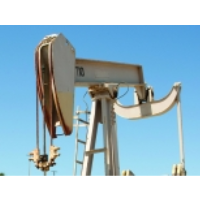Fracking Lurks Behind Potential Monterey Shale Oil Boom

The federal government plans to auction off drilling rights in California to a big hunk of the largest source of shale oil in the United States after declaring that the controversial practice of hydraulic fracturing, known as fracking, would have “no significant impact” on the environment.
The December auction of the Monterey Shale by the U.S. Bureau of Land Management would be its second in about 15 months and by far the largest of the two. The 17,847 acres stretch across 79 parcels in three counties—Monterey, San Benito and Fresno. The first auction was one-fifth that size.
The Center for Biological Diversity filed formal notice last month that it intends to sue the bureau for failing to properly evaluate the dangers of fracking and the effects drilling would have on endangered species in the area.
“A fracking boom could push some of California’s most beloved endangered species over the edge,” Brendan Cummings, the center’s public lands director, wrote in a press release. “Yet the federal government is leasing out large tracts of our public lands for drilling with no real consideration of the risks fracking development poses to the California condor and other imperiled animals.”
California is the fourth largest oil-producing state in the country and the Monterey Shale offers the prospect of a lucrative oil boom in a troubled economy. The federal government estimates that 64% of the nation’s oil shale, 15.4 billion barrels of oil, is in that field. By contrast, the country uses about 19 million barrels of oil a day.
Fracking has been around for half a century, but California has no way of knowing how many drilling operations in the state employ it and, if they do, what chemicals are being used.during the process. State lawmakers failed to act on two pieces of fracking legislation, Assembly bills 591 and 972, in the last session.
AB 591 would have required drillers to disclose where they frack and what chemicals they frack with, and AB 972 would have imposed a fracking moratorium until the state could devise more extensive regulation.
Fracking requires the use of powerful pumps to force a pressurized mix of water and chemicals deep into layers of shale, causing fractures and allowing the extraction of otherwise unavailable natural gas or oil.
Although the chemical mix is about 99% water, the remaining 1% can include methanol, hydrofluoric acid, sulfuric acid and formaldehyde. Critics say fracking has been linked to groundwater contamination, air pollution, releases of methane gas, micro-earthquakes and sink holes.
Not everyone is sold on the proposition that the Monterey Shale will yield the anticipated bounty. Bob Brackett, an analyst for the global asset management firm Alliance Bernstein, wrote a report in July that was skeptical of the field’s potential. “We don't expect a ‘Bakken Boom’ to strike the San Joaquin Valley,” Brackett wrote. “We expect California production to grow only modestly.”
Brackett suggested that certain geological characteristics could make drilling difficult and the oil product thick and sticky. While some skeptics point to California’s generally enhanced regulatory environment as a possible detriment to a Monterey Shale oil boom, Brackett maintained that permitting hasn’t been a problem there and that oil production, so far, has mostly tracked the price of oil.
The oil companies just want a higher price, he said, to justify the risk. Gasoline prices have risen about 10% since Brackett’s report.
–Ken Broder
To Learn More:
U.S. to Auction State Shale for Drilling (by Stephanie M. Lee, San Francisco Chronicle)
60-Day Notice of Intent to Sue BLM (Center for Biological Diversity) (pdf)
Protest of BLM’s September 14, 2011 Competitive Oil and Gas Sale (Sierra Club, Los Padres Forest Watch and Center for Biological Diversity) (pdf)
Fracking: Monterey Shale Exploration Draws Protest (by Ashlie Rodriguez, Los Angeles Times)
Analyst: Calif. Shale Oil Field Results Disappoint (Associated Press)
Two Bills to Regulate Fracking Die in the Legislature (by Ken Broder, AllGov)
- Top Stories
- Controversies
- Where is the Money Going?
- California and the Nation
- Appointments and Resignations
- Unusual News
- Latest News
- California Forbids U.S. Immigration Agents from Pretending to be Police
- California Lawmakers Urged to Strip “Self-Dealing” Tax Board of Its Duties
- Big Oil’s Grip on California
- Santa Cruz Police See Homeland Security Betrayal in Use of Gang Roundup as Cover for Immigration Raid
- Oil Companies Face Deadline to Stop Polluting California Groundwater





